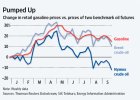Sapper!
Excuse the BS...
If it were only so simple. There is no money to be made in refining. The margins razor thin. There is no incentive for the industry to invest in refining capacity. There is a reason we don't build refineries in the country... just as we don't build nuke power plants... its FUCKING expensive and the return is near 0.
Correct, sort of. You are right there is no profit margin currently although refineries make quite a bit of money around here. The issue is that the federal government has explicitly targeted industrial construction and the petro chemical industry. Between the outrageous overhead, the competition from ethanol, the taxes imposed at the pump and on the companies, correct the money isn't there. But rest assured there is lots of money being made in refining, Exxon and BP are the largest grossing companies in the world. They pay over 100 billion together in taxes but hey they are in business for a reason. The real catch here is that if you upped refining capacity around here with more infastructure you can run your plants longer because the raw product is available. If you do that long enough you drop your $/gal overhead and the profit margin jumps. Oil companies up until 2000 made about 3-4% annually, they would have been better off liquidating their assets and investing it somewhere else. They didn't and now these guys are pulling in lots of money, sadly before 2008 there was so much mom and pop oil and gas around here things boomed. The profit margins weren't big but there is tons of small time, big money oil guys around because of it. Tell me they aren't making money because my town hasn't had empolyment drop hardly one bit except for some uncertainty during the BP spill and even then they just kind of layed dormant. I was offered a six figure job just a week ago by a buddy dying to get his hands on some military guys to do safety work (which I have zero experience in!), he hired 4 guys in one week. My chemical engineering department and the petroleum engineering department at my college has a 100% job placement for graduates. Money is there refining, drilling , upstream, downstream, whatever, the government is just fixing the stupid game.
http://www.texasgulfcoastonline.com/news/tabid/86/ctl/articleview/mid/466/articleid/72/default.aspx





